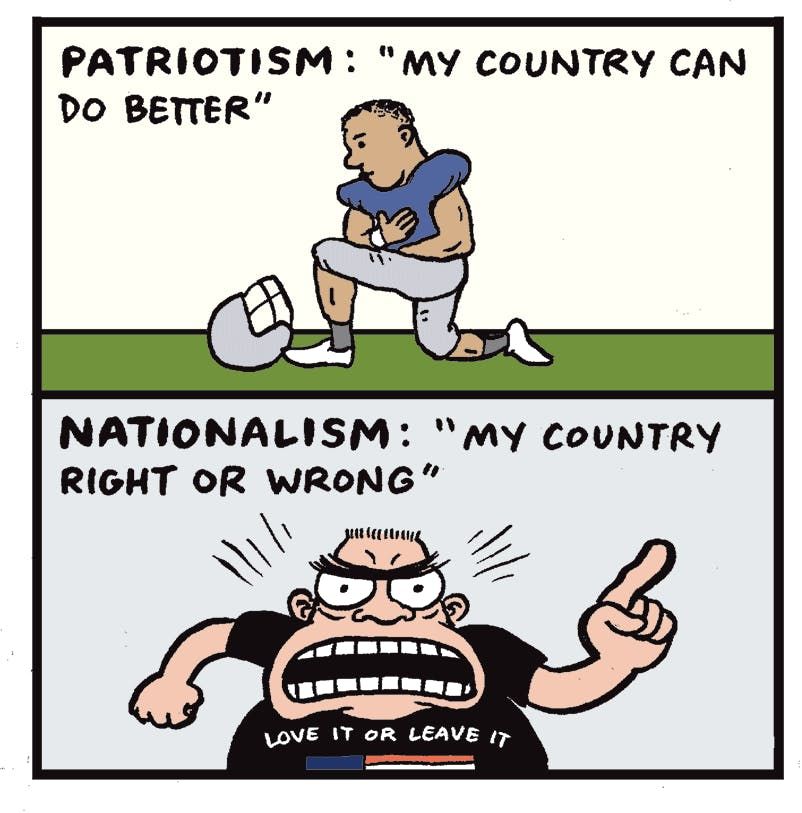Nationalism V. Patriotism
Jun 16, 2019 • 20 views

“Nationalism is an infantile thing. It is the measles of mankind” was said by renowned physicist, Albert Einstein. Nationalism and Patriotism are terms that are widely misunderstood for each other. One must understand that there exists a stark difference between the two. Nationalism has an aggressive and oppressive connotation to it whereas Patriotism portrays the love for the country in a passive manner.
Nationalism promotes a sense of superiority of one nation over other nations. It suppresses any sort of dissent against the nation. It can take violent forms and results in bloodshed, wars, and conflicts. For example, we have seen in the past as to how the partition between India and Pakistan had disastrous consequences. It led to large scale displacement of people from homes and in communal riots where the blood of many innocents was shed.
Patriotism on the other hand, means showing respect towards one's country without oppressing others. It is about being sensitive to the needs of the people and treating them with dignity. It is about showing one’s love for the country without harboring feelings of hatred, racism, xenophobia and religious bigotry. It is about dwelling on what is right for the country and its people. It involves understanding the opinions of all citizens and doing what is right for the people.
Nationalism gets mixed with feelings of xenophobia, racism, and religious fundamentalism. A Nationalist will stop at nothing until he establishes his/her superiority over others. It often takes a violent guise enough to decimate and displace human populations.
Our history is ridden with examples of how Nationalism has caused many wars to take place. These wars were fought to either establish the superiority of one’s ideology or race over others. For instance, Anti-Semitism is an offshoot of aggressive Nationalism or Hyper-Nationalism. It led to the massacre of innumerable number of Jews in the past.
Even today, Nationalism becomes a tool for political gains. The leader of each country tries to play with the emotions of the people under the garb of Nationalism. Instead of focusing on major problems such as poverty, illiteracy or unemployment, politicians tend to use Nationalism as a way to turn people’s attention away from these problems.
Nationalism is being used by the majority to trump minority. It means domination of one group of people over the others based on ethnicity, language, race or religion. For instance, we see how the Tamils are a minority in Sri Lanka and have very little say in the governance of the country. Similarly, a Palestinian Arab would never feel equal to an Israeli Jew.
One of the offshoots of Nationalism is Sub-Nationalism. Sub-Nationalism is the demand for a separate State based on ethnic and linguistic grounds. The formation of States such as Telangana, Uttarakhand, Jharkhand, etc has taken place because of Sub-Nationalism. Everyone already knows about the Khalistan movement in the past that demanded a separate State for the Sikhs. This movement can also be defined as a sub-nationalist movement.
It is true that Nations have unified us and brought us together based on similarities such as race, language, religion, and ethnicity but using these factors as a means to attain selfish goals is wrong. Constructive criticism needs to take place for any Nation to grow. Just imposing one’s views on others and trying to gain superiority through violence will only lead to more conflict and distrust.
In order for a Nation to prosper, it must be accommodative of everyone’s needs and aspirations. Further, there should be no discrimination based on race, religion, ethnicity or language. One must take pride in one’s country’s achievements but one must be able to draw a line so that pride does not culminate into aggression. So, now it is left to each one to decide whether he/she wants to be a Patriot or a Nationalist?
